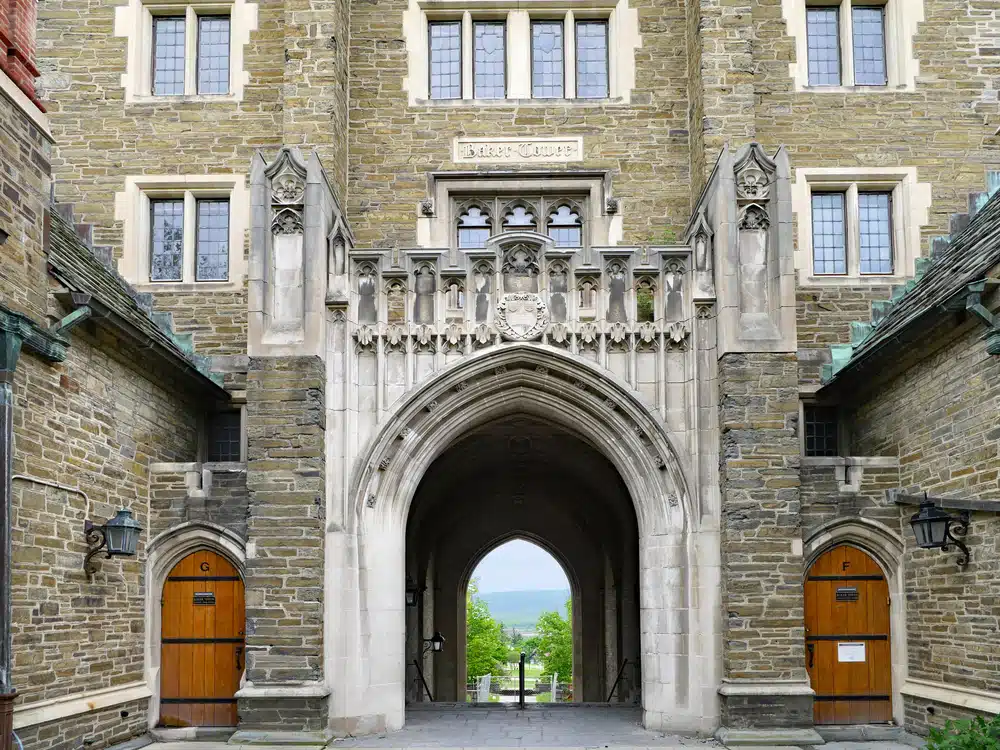A Glance at Cornell Computer Science Program
Founded in 1865, Cornell University is an Ivy League research university in Ithaca, New York. It is known for its distinguished faculty, rigorous academic programs, and vibrant campus life. Among its many esteemed departments, Cornell Computer Science holds a significant reputation.
The computer science department, established in 1965, is one of the oldest, most respected, and most prestigious in the world, recognized for its groundbreaking research, top-tier faculty, and rigorous educational programs.
The Department of Computer Science at Cornell provides undergraduate and graduate degree programs, which include Bachelor of Arts, Bachelor of Science, Master of Engineering, Master of Science, and Ph.D. in Computer Science. It nurtures a diverse and inclusive community, cultivating an environment conducive to innovation, creativity, and intellectual curiosity.
From introducing students to the fundamental principles of computing to pushing the boundaries of technology through cutting-edge research, the Department of Computer Science plays an integral role in Cornell’s pursuit of academic excellence.
History of Computer Science at Cornell
The Department of Computer Science at Cornell University was founded in 1965. This has made the department one of the oldest computer science departments that is in the US. Over the years, it has experienced several key milestones, including its early leadership under the guidance of Juris Hartmanis, who later received the Turing Award for his work in computational complexity theory.
The department’s growth and development have been marked by the establishment of several renowned research groups and laboratories, each contributing to groundbreaking advancements in fields like artificial intelligence, computer graphics, systems and networking, and theoretical computer science. Notable faculty members include Turing Award winners John Hopcroft and Robert E. Tarjan, who have significantly contributed to data structures and algorithms.
Esteemed alumni have also had a substantial impact on the field, such as Robert Tappan Morris, known for creating the first worm on the internet and co-founding the Y Combinator startup incubator. Cornell Computer Science Department has not only left an indelible mark on academia, with countless research papers and patents to its credit but has also significantly influenced the broader industry.
Its innovative approaches to computing have often been ahead of their time, and its alumni and faculty have led numerous technological breakthroughs that have trailblazed what is possible in computer science. The department’s rich history and far-reaching impacts underscore its ongoing commitment to knowledge and training the next generation of computer science leaders.
Cornell Computer Science Programs
Undergraduate Program
The University offers a range of undergraduate Cornell Computer Science Programs that cater to its students’ diverse interests and career goals. The Bachelor of Arts (BA) in Computer Science, housed in the College of Arts and Sciences, offers students a solid foundation in computer science, complemented by breadth in the liberal arts.
The Bachelor of Science (BS) in Computer Science, offered through the College of Engineering, includes a stronger emphasis on the technical and mathematical aspects of the field. For students wishing to study computer science alongside another discipline, the department also offers joint majors, integrating computer science with fields such as Mathematics, Economics, and Information Science, allowing students to explore the intersections of these fields.
Moreover, for students majoring in other disciplines who wish to acquire computer science skills, the department offers a minor in computer science, enabling them to gain essential knowledge and skills in programming, data structures, and other core areas of the discipline.
Graduate Program
Cornell’s Department of Computer Science offers robust graduate programs to prepare students for academia, industry, and research leadership roles. The Master of Engineering (M.Eng.) in Computer Science is a professional degree program that combines advanced coursework with a capstone project, providing students with theoretical understanding and practical application of computer science.
The Master of Science (M.S.) in Computer Science, on the other hand, is a research-focused degree often pursued by students interested in delving deeper into specific areas of computer science or those planning to continue onto a doctoral program.
The Doctor of Philosophy (Ph.D.) program in Computer Science is a rigorous and intensive research program that gives the students the opportunity to work closely with faculty members on cutting-edge research in artificial intelligence, computer graphics, systems and networking, theory of computing, and more. The program aims to prepare students for careers in academia, research, or industry where they can contribute to advancing knowledge in computer science.
Cornell Computer Science Curriculum and Specializations
Core curriculum overview
The core curriculum of Cornell’s Computer Science program is designed to provide a solid foundation in the field. It begins with introductory courses in programming, data structures, and discrete structures. This is followed by intermediate-level courses that cover key areas such as computer system organization, algorithms and data structures, and the principles of programming languages.
There are also requirements for advanced mathematics and probability theory. These core courses equip students with the essential knowledge and skills required to navigate the rapidly evolving field of computer science.
Areas of specialization
Cornell’s Department of Computer Science offers a wide range of specializations to accommodate the diverse interests of its students. The Artificial Intelligence track explores machine learning, natural language processing, and robotics. The Computer Graphics specialization covers visualization, animation, and virtual reality.
In the Systems and Networking track, students delve into designing and managing computer systems and networks. The Theory of Computing offers a deep dive into algorithms, complexity theory, and the mathematical aspects of computer science. The Human-Computer Interaction track focuses on the design and implementation of user-friendly interfaces.
Beyond these, other specializations like data science, cybersecurity, and quantum computing are available to cater to evolving industry needs and technological advancements. Each specialization equips students with deep knowledge and skills in a particular area of computer science, preparing them for specific roles in academia, industry, and research.
Interdisciplinary studies and opportunities
The Cornell Computer Science Department encourages interdisciplinary studies, recognizing that the application of computer science extends beyond traditional boundaries. Students have opportunities to integrate computer science with disciplines such as biology, physics, economics, linguistics, philosophy, and more, offering unique perspectives and enhancing their ability to solve complex, real-world problems.
This interdisciplinary approach allows for innovative research and collaborative projects that can drive technological advancements and address societal challenges. Furthermore, joint degree programs and interdisciplinary research centers allow students to work with faculty and peers from various fields.
The department also encourages internships and co-op programs, providing students with practical experience and exposure to how computer science is applied in different industries. Such opportunities foster a broader understanding of computer science and its transformative role in multiple disciplines.
Cornell Computer Science Research Opportunities
Overview of research in the department
The Department of Computer Science at Cornell University is renowned for its pioneering research, making significant contributions to both theoretical and applied areas of computer science. Research within the department spans many areas, including artificial intelligence, computer graphics, systems and networking, theory of computing, and human-computer interaction.
With an emphasis on interdisciplinary collaboration, researchers often work across departmental lines, linking with other scientific fields such as biology, physics, and economics. The department’s strong ties with various research labs, centers, and institutes, both within and outside the University, provide opportunities for students and faculty to work on cutting-edge Cornell Computer Science Research projects.
Faculty members, often world leaders in their respective fields, guide research efforts, and students at all levels are encouraged to participate, fostering an environment of learning, exploration, and innovation. Through its research initiatives, the department continually pushes the boundaries of computer science knowledge, shaping the field’s future.
Major research labs and groups
Cornell University‘s Department of Computer Science houses several major research labs and groups, each dedicated to advancing knowledge in a specific area of computer science.
These include the Artificial Intelligence Lab, which focuses on machine learning and natural language processing; the Graphics and Vision Group, which conducts research in computer graphics and computer vision; and the Systems and Networking Group, which explores areas like distributed systems, databases, and computer networks. The Programming Languages and Software Engineering Group is another active research group working on developing reliable and efficient software systems.
In addition, the Theory of Computing Group delves into the mathematical foundations of computer science, while the Human-Computer Interaction Group focuses on creating more usable and effective technology. These labs and groups foster a collaborative and innovative research environment where faculty, graduate students, and often undergraduates work together on projects, pushing the boundaries of computer science research.
Student involvement in research
Cornell Computer Science Department deeply values student involvement in research, recognizing that it fosters critical thinking, problem-solving skills, and a deeper understanding of the field. Both undergraduate and graduate students have ample opportunities to engage in research alongside faculty members. Many students co-author papers published in prestigious journals and conference proceedings, contributing to significant advancements in the field.
The department also encourages students to undertake independent research projects under faculty guidance, which can lead to an honors thesis for undergraduate students or progress toward a dissertation for graduate students.
Additionally, research assistantships provide students with practical experience working on funded research projects. By promoting student involvement in research, the department enriches students’ learning experiences and prepares them for future careers in academia, industry, and research.
As you learn more about Cornell Computer Science, you should also prepare for your college admission. If you wish for guidance in your journey, AdmissionSight will help you through the competitive admissions process. With their team of top experts, you can surely get accepted to the top universities in the world with the help of AdmissionSight. Set up an appointment today and get the best help getting into university.







































